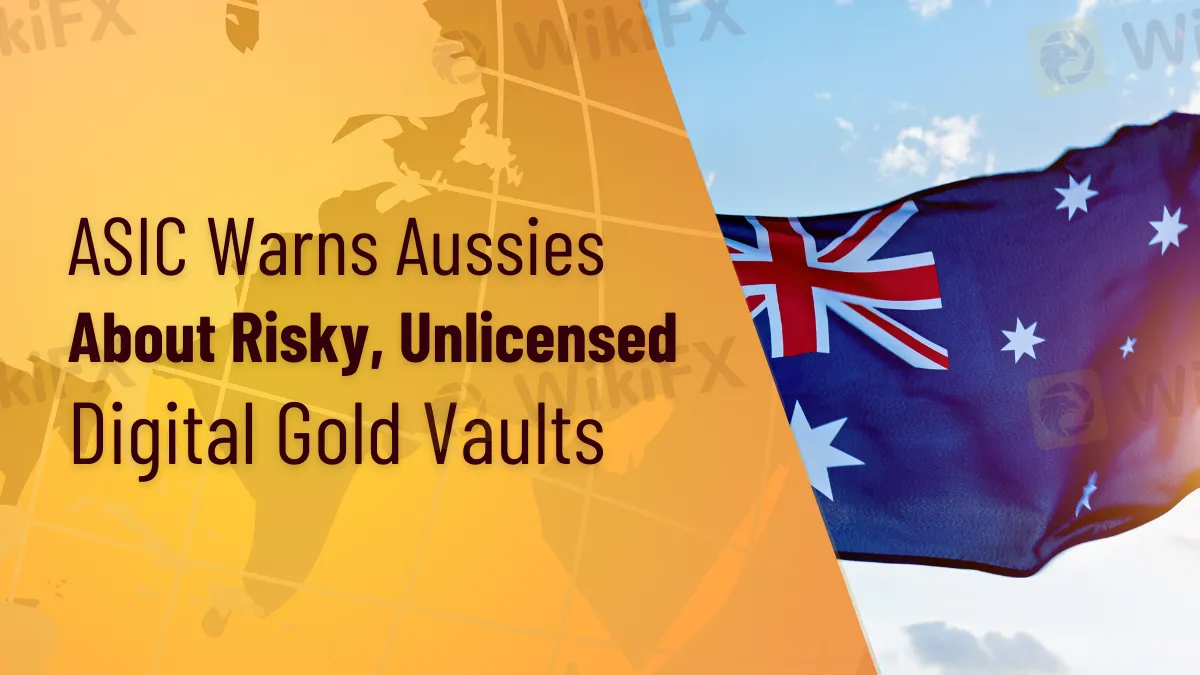简体中文
繁體中文
English
Pусский
日本語
ภาษาไทย
Tiếng Việt
Bahasa Indonesia
Español
हिन्दी
Filippiiniläinen
Français
Deutsch
Português
Türkçe
한국어
العربية
ASIC Warns Aussies About Risky, Unlicensed Digital Gold Vaults
Abstract:ASIC warns Australians about the risks of unlicensed digital gold vaults, highlighting potential scams and the difficulties of verifying and recovering investments.

The Australian Securities and Investments Commission (ASIC) has issued a harsh warning to Australians about the growing hazards linked with unregulated digital gold vaults. These dangerous investment schemes are gaining popularity, tempting customers with promises of passive income and high returns but are laden with risks.
Emerging Risks with Unlicensed Entities
ASIC has discovered a rising trend involving unregistered businesses offering fraudulent investment possibilities in digital gold vaults. These companies often market their offerings to trusted personal networks, such as family and friends, using internet platforms such as Instagram and Facebook. They portray their schemes as profitable, with the prospect of passive income merely by attracting new investors.
In these schemes, customers are urged to acquire the privilege of using a digital gold vault for a specific amount of time. The concept is that additional investors will use this vault to store virtual gold, earning profits for the original investment. However, these refunds may not be as safe or authentic as they look.
Problems with Verification and Recourse
ASIC expressed concern about the difficulties in validating these digital gold vaults. Frequently, the corporations underlying these investments are domiciled abroad, making it difficult for Australian investors to obtain redress in the event of a disagreement. These investment plans' terms and conditions might also be convoluted, making any efforts to address difficulties much more difficult.

Furthermore, these assets may be organized in ways that hide their genuine nature. For example, some digital gold investments include tokens or units that are said to be backed by actual gold bullion housed in professional vaults. Others might be listed on stock markets as exchange-traded products (ETPs). The Corporations Act 2001's regulatory structure implies that such investments may be considered 'financial products' or even managed investment schemes, requiring particular license or registration.
Potential for Fraudulent Schemes
ASIC cautions that some of these digital gold vault schemes may be fraudulent, with returns financed by new investors rather than real revenues. This structure may imply a Ponzi scheme, in which rewards are paid from new investors' contributions rather than legitimate investment gains.
Furthermore, some unlicensed businesses provide additional goods like as debit cards connected to these investments, allowing for worldwide cash withdrawals and transactions. These products may also be categorized as non-cash payment facilities under the Corporations Act 2001, requiring issuers to have an Australian Financial Services (AFS) license.
About ASIC
ASIC is Australia's business, market, and financial services regulator. ASIC is in charge of enforcing and regulating corporate and financial services laws to safeguard consumers, investors, and the integrity of the financial markets.
Get the latest updates on digital gold vaults and other investment warnings on the WikiFX news page.

Disclaimer:
The views in this article only represent the author's personal views, and do not constitute investment advice on this platform. This platform does not guarantee the accuracy, completeness and timeliness of the information in the article, and will not be liable for any loss caused by the use of or reliance on the information in the article.
Read more

Axi Bids AUD 52M to Acquire Low-Cost Broker SelfWealth, Outbidding Competitor Bell Financial
This acquisition attempt by AxiCorp Financial Services Pty Ltd, Axi’s parent company, values SelfWealth at AUD 0.23 per share and is notably higher than a recent bid made by Bell Financial Group Limited (ASX), which offered AUD 0.22 per share.

Why Even the Highly Educated Fall Victim to Investment Scams?
Understanding why educated individuals fall victim to scams serves as a stark reminder for all traders to remain vigilant, exercise due diligence, and keep emotions firmly in check.

Bitfinex Hacker Ilya Lichtenstein Sentenced to 5 Years in Prison
Bitfinex hacker Ilya Lichtenstein was sentenced to 5 years for stealing 120K Bitcoins as the cryptocurrency soars past $93K amid bullish market trends.

Italy’s CONSOB Blocks Seven Unregistered Financial Websites
Italy’s CONSOB ordered seven unauthorized investment websites blocked, urging investors to exercise caution to avoid fraud. Learn more about their latest actions.
WikiFX Broker
Latest News
CySEC Warns Against Unauthorized Investment Firms in Cyprus
Why Even the Highly Educated Fall Victim to Investment Scams?
Warning Against Globalmarketsbull & Cryptclubmarket
Dukascopy Bank Expands Trading Account Base Currencies
UK Sets Stage for Stablecoin Regulation and Staking Exemption
Axi Bids AUD 52M to Acquire Low-Cost Broker SelfWealth, Outbidding Competitor Bell Financial
Crypto Influencer's Body Found Months After Kidnapping
STARTRADER Issues Alerts on Fake Sites and Unauthorized Apps
Italy’s CONSOB Blocks Seven Unregistered Financial Websites
Bitfinex Hacker Ilya Lichtenstein Sentenced to 5 Years in Prison
Currency Calculator


